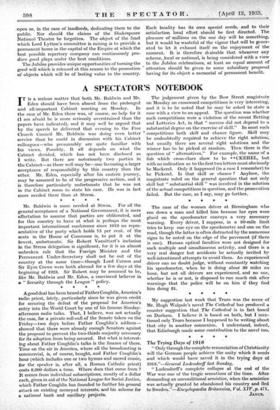A good deal has been heard of Father Coughlin, America's
radio priest, lately, particularly since he was given credit for securing the defeat df the proposal for America's entry into the World Court by one of his famous Sfinday- afternoon radio talks. That, I believe, was not actually the case, for a private roll-call of the Senate taken on the Friday—two days before Father Coughlin's address— Showed that there were already enough Senators against the proposal to prevent the two-thirds majority necessary for its adoption from being secured. But what is interest- ing about Father Coughlin's talks is the finance of them. Time on the air in America, where all the broadcasting is commercial, is, of course, bought, and Father Coughlin's hour (which includes one or two hymns and sacred music, for the speaker is, after all, a Roman Catholic priest) costs 8,000 dollars a time. Where does that come from ?
It comes from individual subscriptions, mostly of a dollar each, given in aid of the National League for Social Justice, which Father Coughlin has founded to further his general attack on existing moneyed interests, and his scheme for a national bank and ancillary projects. The judgement given by the Bow Street magistrate on Monday on crossword competitions is very interesting, and it is to be noted that he may be asked to state a case with a view to an-appeal. The question was whether such competitions were a violation of the recent Betting and Lotteries Act, in that " success did not depend to a substantial degree on the exercise of skill." In most such competitions both skill and chance figure. Skill may he undoubtedly required to achieve the right solution; but usually there are several right solutions and the winner has to be picked at random. Then there is the queition of " alternatives." For example, the name of a fish which cross-clues show to be **CKEREL, but with no indication as to the first two letters must obviously be Mackerel. Only it happened (in a case I remember) to be Pickerel. Is that skill or chance ? Anyhow, the magistrate ruled on the general question that not only skill but " substantial skill " was involved in the solution of the actual competitions in question, and the prosecution failed. But the case, as I say, may go further.


















































 Previous page
Previous page